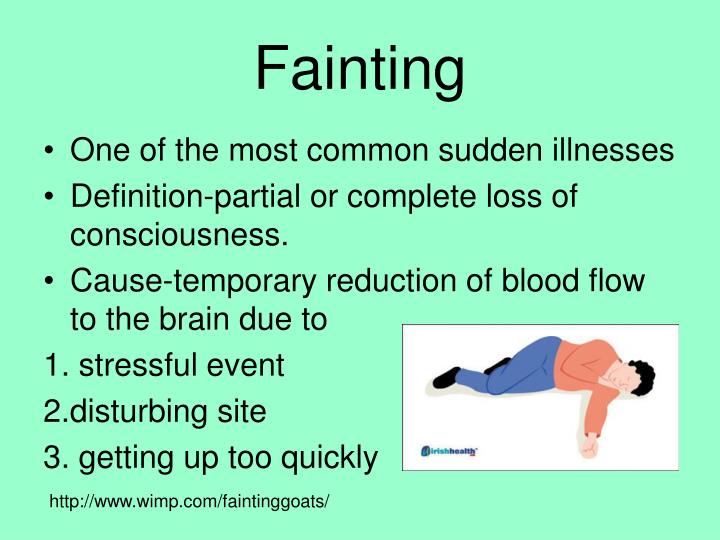The Enigma of Sudden Fainting in Men: Understanding the Causes and Seeking Help
Related Articles: The Enigma of Sudden Fainting in Men: Understanding the Causes and Seeking Help
Introduction
With great pleasure, we will explore the intriguing topic related to The Enigma of Sudden Fainting in Men: Understanding the Causes and Seeking Help. Let’s weave interesting information and offer fresh perspectives to the readers.
Table of Content
The Enigma of Sudden Fainting in Men: Understanding the Causes and Seeking Help

Fainting, also known as syncope, is a sudden, temporary loss of consciousness caused by a decrease in blood flow to the brain. While fainting can occur in anyone, men are not immune to this experience. In fact, certain factors can make men more susceptible to sudden episodes of fainting. This article explores the complex interplay of factors that can lead to fainting in men, highlighting the importance of understanding its potential causes and seeking prompt medical attention.
Unveiling the Mechanisms Behind Fainting:
Fainting arises when the brain is deprived of oxygen-rich blood. This deprivation can occur due to various reasons, including:
- Vasovagal Syncope: This is the most common type of fainting, often triggered by emotional stress, pain, or prolonged standing. It is characterized by a sudden drop in blood pressure and heart rate, leading to reduced blood flow to the brain.
- Orthostatic Hypotension: This condition occurs when blood pressure drops significantly upon standing up, causing a reduction in blood flow to the brain. It is often associated with dehydration, medications, and certain medical conditions.
- Cardiac Syncope: This type of fainting is caused by problems with the heart’s electrical system, leading to irregular heartbeats or a sudden decrease in heart function. It can be a sign of serious underlying heart conditions.
- Neurological Syncope: Fainting can also be caused by neurological disorders affecting the brain’s ability to regulate blood pressure and heart rate. This may include conditions like seizures or migraines.
- Other Causes: Fainting can also be triggered by factors like low blood sugar, anemia, and certain medications.
Factors Contributing to Fainting in Men:
While the underlying mechanisms of fainting are similar across genders, certain factors can make men more susceptible to this condition:
- Age: As men age, they are more prone to cardiovascular issues, which can increase the risk of cardiac syncope.
- Lifestyle Factors: Smoking, excessive alcohol consumption, and a sedentary lifestyle can contribute to cardiovascular problems and increase the risk of fainting.
- Medical Conditions: Conditions like diabetes, high blood pressure, and heart disease can significantly increase the risk of fainting in men.
- Medications: Certain medications, particularly those affecting blood pressure or heart rate, can increase the risk of fainting.
- Underlying Neurological Conditions: Neurological disorders like epilepsy and migraines can also contribute to fainting in men.
The Importance of Seeking Medical Attention:
While fainting can be a frightening experience, it is crucial to remember that most episodes are harmless and resolve on their own. However, it is essential to seek medical attention if fainting occurs:
- For the first time: Even if the episode was brief and the individual recovered quickly, it is important to consult a doctor to rule out any underlying medical conditions.
- Repeatedly: Recurring episodes of fainting warrant immediate medical evaluation to determine the underlying cause and manage the condition effectively.
- Accompanied by other symptoms: Fainting accompanied by chest pain, shortness of breath, confusion, or prolonged loss of consciousness requires prompt medical attention, as these symptoms could indicate a serious underlying medical condition.
- After a head injury: Fainting following a head injury should be considered a medical emergency and requires immediate evaluation by a healthcare professional.
Diagnosis and Treatment:
Diagnosing the cause of fainting involves a thorough medical evaluation, including a physical examination, medical history review, and diagnostic tests. These tests may include:
- Electrocardiogram (ECG): This test measures the electrical activity of the heart to identify any abnormalities.
- Holter Monitor: This portable device records the heart’s electrical activity over a 24-hour period, allowing for the detection of intermittent heart rhythm problems.
- Tilt Table Test: This test measures blood pressure and heart rate while the individual is gradually tilted to a standing position, helping to diagnose orthostatic hypotension.
- Blood Tests: These tests can help identify underlying conditions like anemia, low blood sugar, and electrolyte imbalances.
- Imaging Studies: In some cases, imaging studies like an echocardiogram or MRI may be necessary to assess the heart or brain.
Treatment for fainting depends on the underlying cause. Some general recommendations include:
- Lifestyle Modifications: Addressing modifiable risk factors like smoking, excessive alcohol consumption, and sedentary lifestyle can reduce the risk of fainting.
- Medications: Depending on the underlying cause, medications may be prescribed to manage blood pressure, heart rate, or other medical conditions.
- Avoiding Triggers: Identifying and avoiding triggers like emotional stress, prolonged standing, and certain medications can help prevent future episodes.
FAQs Regarding Fainting in Men:
Q: What are some common triggers for fainting in men?
A: Common triggers include emotional stress, pain, prolonged standing, dehydration, certain medications, and exposure to hot or crowded environments.
Q: Should I be concerned if I faint for the first time?
A: It is essential to consult a doctor after a first episode of fainting, even if it was brief and you recovered quickly. This allows for the exclusion of any underlying medical conditions.
Q: What are the potential complications of fainting?
A: While most fainting episodes are harmless, potential complications include injuries from falls, prolonged loss of consciousness, and underlying medical conditions that require immediate treatment.
Q: How can I prevent fainting?
A: Lifestyle modifications like maintaining a healthy weight, exercising regularly, avoiding alcohol and smoking, and staying hydrated can help reduce the risk of fainting.
Q: When should I call emergency services?
A: Call emergency services immediately if you or someone else experiences fainting accompanied by chest pain, shortness of breath, confusion, prolonged loss of consciousness, or any other concerning symptoms.
Tips for Dealing with Fainting:
- Stay Hydrated: Dehydration can contribute to fainting, so drink plenty of fluids throughout the day.
- Avoid Triggers: Identify and avoid potential triggers that have caused fainting in the past.
- Seek Medical Attention: If you experience fainting, it is crucial to consult a doctor to determine the underlying cause and receive appropriate treatment.
- Educate Yourself: Learn about the different types of fainting, their causes, and potential complications to better understand the condition.
- Share Your Experience: Discuss any concerns or questions with your doctor or other healthcare professionals.
Conclusion:
Fainting in men, while a common occurrence, can be a sign of underlying medical conditions that require prompt medical attention. Understanding the various causes, potential triggers, and appropriate treatment options is crucial for managing this condition effectively. By seeking medical evaluation, addressing modifiable risk factors, and adopting a proactive approach to health, men can minimize the risk of fainting and live healthier lives.

:max_bytes(150000):strip_icc()/1298399-article-img-causes-of-fainting1-5a5520127bb283003773f0c9.png)






Closure
Thus, we hope this article has provided valuable insights into The Enigma of Sudden Fainting in Men: Understanding the Causes and Seeking Help. We hope you find this article informative and beneficial. See you in our next article!